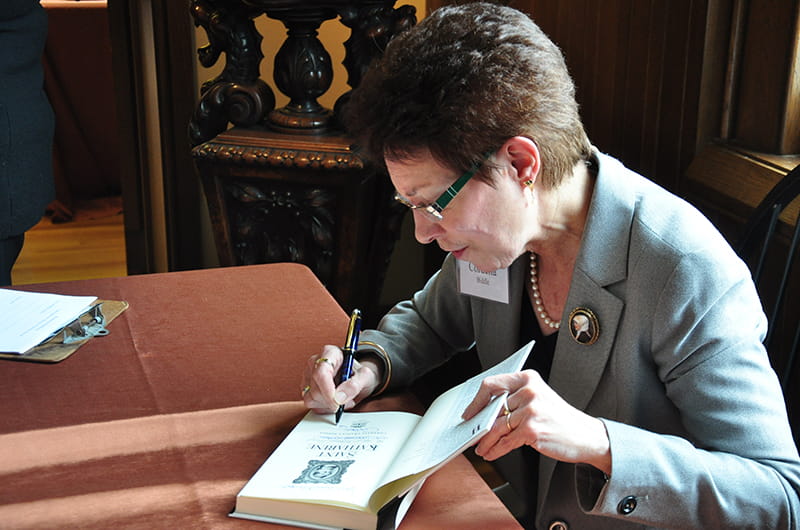The Story of the World’s Wealthiest Nun

Undated photo of Saint Katharine Drexel. Photo courtesy Drexel University Archives.
The canonization of Saint Katharine Drexel, the niece of the founder of Drexel University, was an uncommon reunion of sorts for the 200 members of the Drexel family who attended the ceremony in October 2000. Along with 300,000 other people, they braved the rain beating down on their umbrellas and puddling around their ankles during the long ceremony. But when Katharine’s name was announced, something astonishing happened: the skies cleared up to the point where the sun was shining and a rainbow could be spotted.
“It was such an extraordinarily holy moment. And I just thought, ‘I have to write this woman’s story,’” remembered Cordelia Frances Biddle, an author who teaches creative writing courses in the Pennoni Honors College. Her great-grandmother was Katharine’s beloved cousin Emilie Drexel Biddle, Anthony J. Drexel’s daughter.
Katharine Drexel’s story certainly is unlike any other. Born in 1858 to one of Philadelphia’s wealthiest and most prominent families, the heiress and society girl shocked her family and the nation when she became a Roman Catholic nun and social activist at age 31. Using her inheritance of $7 million (about $180 million in today’s currency), she spent the next 60 years and an estimated $20 million building missions, schools and churches for Native Americans and African-Americans. She was known as the world’s wealthiest nun, and the only nun to found a university: Xavier University of Louisiana, the only historically black college or university that is Catholic.
After her death in 1955, Katharine was beatified (one of the steps in becoming a saint) in 1987, 100 years after she was inspired to enter religious life after a meeting with Pope Leo XIII. The first miracle ascribed to her occurred in 1974, when a local boy’s eardrum was healed. In 2000, she was canonized after a little girl’s deafness was cured. Biddle attended the canonization with other Drexel family members, and wondered what it would be like to write about her extraordinary family member.
“I waited a while because I didn’t think I was a good enough person,” Biddle said. “I simply didn’t think I could understand that personality of someone who could give it all up.”

To write her eventual book, "Saint Katharine: The Life of Katharine Drexel," she conducted research at the Drexel University Archives, Library of Congress, the Library Company of Philadelphia, Xavier University and the Sisters of the Blessed Sacrament, the Bensalem order of nuns Katharine founded in 1891. She read Katharine’s letters and journals, as well as newspapers from the 96-year period of history she lived through: the entirety of the Civil War, the assassination of Abraham Lincoln, Red Cloud’s War and other major skirmishes with Native Americans out West, the implementation of the Jim Crow Laws and the Ku Klux Klan, the founding of the NAACP, women’s suffrage. The historical perspective, Biddle said, was essential to learning about the twists and turns of Katharine’s life.
“I realized I could follow this journey with her, to some extent. She was a pampered girl who became a pampered young woman—so where did this woman come from? How did she move towards that?” Biddle explained.
It all started in a place Biddle was familiar with: Anthony Drexel’s home. After Katharine’s mother died shortly after her birth, Katharine and her older sister lived with “Uncle Tony” for two years until her father Francis remarried Emma Bouvier (a distant relative of Jacqueline Kennedy Onassis). Anthony also raised his grandson after the boy’s mother — Anthony’s daughter Emilie — died; the boy was Biddle’s grandfather.
“My grandfather’s upbringing, as a young man, was very similar to Katharine’s. Stories of his youth were probably duplicated a generation earlier in hers,” Biddle said. “I look at Tony and he looks very austere, but that’s not according to my grandfather.”
Katharine was very close to “Uncle Tony,” who dispensed business advice and instilled a devotion to helping the underserved. A biography of Anthony describes Katharine as the only member of the third-generation of Drexels that displayed any of the business acumen for which the banking family was known. She founded the Sisters of the Blessed Sacrament the same year her “Uncle Tony” established what was then the Drexel Institute of Art, Science and Industry. About 30 years later, Katharine founded Xavier University. While many families have started colleges or universities, only a select few, like the Drexels, have founded more than one.
Drexel’s campus used to have a mural on an apartment located on what is now called Race Street Lawn, decorated with images of Saint Katharine and her two biological sisters. A whole generation of students used to call the outdoor space “Katharine Drexel Park” before the building was taken down.
Biddle and other members of the Drexel family gathered on campus in November with Norman C. Francis, the president and alum of Xavier University, and Sister Patricia Duchalski, president of the Sisters of the Blessed Sacrament. Biddle discussed Saint Katharine and reminisced on the saint’s canonization ceremony with other members who had been there.
For Biddle, returning to her great-great-grandfather’s institution is just part of the job. She has been teaching courses in mystery writing and “killer” fiction for several years, and received the Pennoni Honors College Outstanding Teacher’s Award in 2012. This spring, she plans on teaching creative nonfiction, her favorite class, for the second time.
Creative nonfiction is a topic she knows well. Now that she’s finished Katharine’s biography, Biddle is currently working on a biography of another prominent ancestor, Nicholas Biddle, who was the president of the Second Bank of the United States and edited “The Journals of Lewis and Clark."
Drexel News is produced by
University Marketing and Communications.

